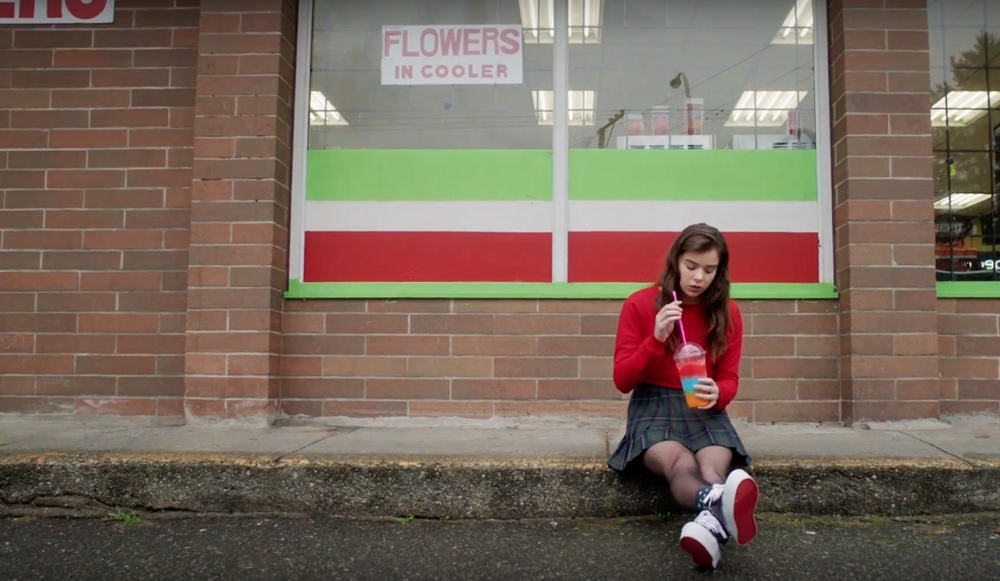
The Edge of Seventeen (Kelly Fremon Craig, 2016)
Midway through The Edge of Seventeen, the mother-daughter duo of Kyra Sedgwick and Hailee Steinfeld sit in a car together and Sedgewick’s Mona turns to Steinfeld’s Nadine to say, “When I get mad I get really quiet and really still and I say to myself ‘Everyone in the world is as miserable as you are. They’re just better at pretending’”.
And it’s with that sentence that the film sold me entirely. Marketed as a story about two friends seemingly being torn apart by a boy in their lives—a tiresome trend in films about teen girls—Seventeen is much more than that. Kelly Fremon Craig and Steinfeld, working perfectly in tandem, offer up a portrait of just how miserable being a teen can be when the circumstances don’t seem to work out for us. And to push it further, it’s about how one can inevitably become the asshole they think everyone around them is.
In avoiding trying to be a universal teen flick, Fremon Craig hones in on exactly what makes Nadine, a perpetually awkward kid who utilizes sarcasm and dark humor to hide the signs of depression among the few folks she interacts with, an interesting and ultimately relatable character. Nadine is entirely unable to pretend that she’s not miserable, and when she does try, as Steinfeld’s vibrant performance reveals, she fumbles, and fumbles, and fumbles.
There’s an utter casualness to the way Fremon Craig presents her directorial debut, with scenes unfolding as they might in real life, with a dash more dramatic flair (and occasionally on-the-nose song choices, but no Stevie Nicks, which is disappointing). Something particularly special is the way she lets her characters shift emotions without having to constantly reinforce how people feel. In one climactic moment, where most filmmakers would have gone for screams and uncomfortable melodrama, she simply has her confrontation happen in calm discussion, allowing the punches to land because of the writing instead of overacting.
Though a few characters, like the film’s admittedly boring “bad boy,” fall into cliché, most sidestep the limited boxes that filmmakers like John Hughes set up for them ages ago. Hayden Szeto’s charismatic Erwin is a glowing example in this, avoiding the pitfalls of the “nice guy” trope in both performance and the fact that Fremon Craig actually writes her male characters with as much substance and humor as her female ones.
—
Directed by Kelly Fremon Craig; written by Kelly Fremon Craig; starring Hailee Steinfeld, Hayden Szeto, Haley Lu Richardson, Blake Jenner, Kyra Sedgwick, and Woody Harrelson; 104 minutes. The Edge of Seventeen is now playing in theaters everywhere.

Miss Sloane (John Madden, 2016)
“Lobbying is about foresight,” Jessica Chastain’s titular character in Miss Sloane repeats a few times during John Madden’s preposterous film. That adjective is not used lightly here to describe a film that doesn’t quite know whether it wants to be a satire on the state of lobbying in America or the kind of trashy novel with vague political commentary you might pick up at the airport. This is a film entirely about a lobbyist named Elizabeth Sloane, who is the best in her biz, even though she reads John Grisham novels in her spare time. You see, she’s a woman who doesn’t compromise and shifts firms in order to sway a vote for tougher gun laws.
While the premise might sound interesting, the film’s greatest flaw is its script. Jonathan Perera, this film the only credit to his name on IMDb, has created something that feels like a rollercoaster ride between a fairly good Aaron Sorkin script and the trashiest Sorkin script you can possible imagine (there are plenty of both to choose from). For each moment in which Chastain is asked to get on a soapbox and deliver moderately interesting monologues in the most methodical way possible, she’s saddled with a scene that forces her to have an emotional breakdown. These moments are made all the more frustrating by Madden’s insistence in pairing all of Chastain’s intense scenes of Acting with a swelling score that drowns out practically everything in the scene. Sure, these bits show range, but in a year where Paul Verhoeven’s Elle presented an “uncompromising” woman with no interest in invalidating her power and the way her mind works, every vaguely personal aside in Miss Sloane undercuts the character it’s trying to present.
The worst of these asides in Sloane is one that features Jake Lacy’s hooker with a heart of gold, an embarrassing subplot that has absolutely no impact on the main narrative and only serves to make the film longer and lend Sloane some unnecessary vulnerability. His removal could have allowed for expansion on any number of subplots and highlighting of an actress with more relevance to the script, particularly the relationship Sloane builds with Gugu Mbatha-Raw’s naive boutique firm lobbyist. But no, Perera and Madden are too preoccupied with all the “James Bond shit” (as they say in the movie) they filled this misguided feature with to focus on the political satire that this could have easily been had it had a better team of writers. Miss Sloane leaves one wishing Armando Iannucci (Veep) or Robert and Michelle King (The Good Wife, Braindead) had access to this cast and synopsis to make something good where so little currently exists.
—
Directed by John Madden; written by Jonathan Perera; starring Jessica Chastain, Gugu Mbatha-Raw, John Lithgow, Michael Stuhlbarg, Mark Strong, Alison Pill, Jake Lacy, Sam Waterston, Dylan Baker & Christine Baranski; 132 minutes. Miss Sloane is now experiencing a limited theatrical release. It expands in Miami on December 9th.



 Derek
Derek
 Isabelle
Isabelle